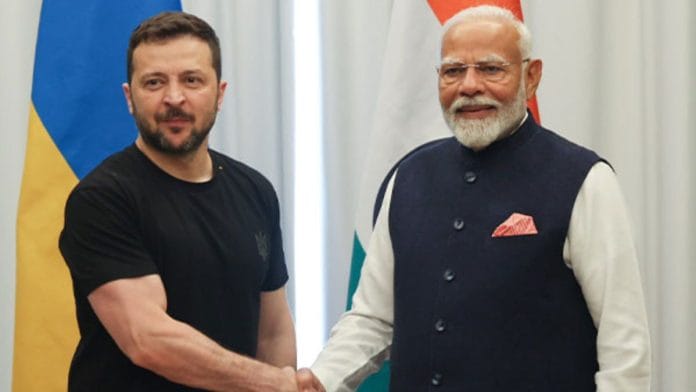When Indian Prime Minister Narendra Modi visited Russia in July 2024, it sparked extensive discussion in China regarding India’s strategic positioning between the United States and Russia. Chinese commentators were divided; some expressed frustration over what they saw as the West’s perceived leniency towards India, while others admired Modi’s adept balancing act. As Modi prepares for a landmark visit to Ukraine later this week, these debates are resurfacing with renewed intensity.
Modi’s visits to Poland and Ukraine mark significant milestones. The trip to Poland is the first by an Indian Prime Minister in 45 years, underscoring India’s growing engagement with Europe and its intent to bolster bilateral relations and extend its influence in the region. More notably, Modi’s visit to Ukraine will be the first by an Indian Prime Minister since the establishment of diplomatic ties between New Delhi and Kyiv in 1993. It’s another sign of India’s careful strategy of balancing its ties with both Russia and Ukraine amid the ongoing conflict.
It reinforces India’s commitment to a diplomatic solution to the conflict and positions the country as a potential mediator. Modi was the only world leader to condemn Russia’s attack on a civilian hospital—by stating that “loss of life leads to despair, especially when children are killed”—in front of Russian President Vladimir Putin. Now, he’s set to visit Ukraine.
Modi’s actions are aligned with his prior assertion that ‘this is not an era of war’, a perspective also echoed in the G20 communique. It reflects India’s broader objective of fostering peace and stability. At the same time, China, which brokered a peace deal between Iran and Saudi Arabia, positions itself as a global peace broker. It’s why China is closely observing India’s visit and its potential role as a mediator in the conflict.
Also read: Chinese are angry that West isn’t outraged enough by Modi meeting Putin
Will Modi bring lasting peace?
Chinese reactions to Modi’s visit to Ukraine reflect a range of perspectives. Many commentators agree that lasting peace in the region will ultimately depend on direct negotiations between Russia and Ukraine, and view Modi’s visit as part of India’s broader effort to facilitate this process.
One analysis provided three key reasons for Modi’s Ukraine visit. First, it suggests that Modi’s visit aligns with a utilitarian approach to diplomacy: while Russia offers valuable resources and technology to India, the West provides markets and investment opportunities. Thus, Modi’s trip can be seen as part of a strategic effort to balance these interests.
Second, by engaging directly with Ukraine and trying to mediate the conflict, Modi aims to bolster his image as a prominent global leader, enhancing India’s stature on the world stage.
Third, the visit is viewed through the lens of competition with China. The commentary highlighted that India’s desire to match China’s diplomatic moves is evident, especially following Beijing’s recent invitation to Ukrainian Foreign Minister Dymtro Kuleba. Modi’s visit, announced shortly after Kuleba’s departure from China on 26 July, seems strategically timed to capitalise on this competitive dynamic.
Another perspective highlights the significance of Ukrainian President Volodymyr Zelenskyy’s meeting with Modi in the broader context of regional peace efforts. Ukraine has been actively seeking support from countries in the so-called Global South, including India. Despite these efforts, India, along with several other nations, did not sign a joint statement at the Ukraine peace summit in Switzerland in June, reflecting differing strategic interests.
But as one commentator pointed out Ukraine views India through a commercial lens as well: state-owned enterprise Zorya-Mashproekt has been negotiating with Indian enterprises for joint production of gas turbines. Additionally, discussions are ongoing regarding the production of aircraft and aircraft engines in India.
Yet another commentator suggested Modi’s visit coincides with a period of Ukrainian passivity, potentially allowing India to make the most of the situation. They note that recent Ukrainian losses in Kursk have weakened Kyiv’s military capacity, making Modi’s visit strategically timed. With the possibility of a Donald Trump re-election in the US limiting Kyiv’s conflict sustainability, New Delhi might find new opportunities to augment its influence.
Also read: China keeps making a strategic blunder—underestimating India’s role in Quad
Less mockery, more appreciation
On Chinese social media, particularly Weibo, there is a range of narratives. One user suggested that Modi’s visit to Ukraine is damage control, following his controversial trip to Russia. Another user noted Modi’s seemingly favourable reputation, observing that his visit to Ukraine follows closely after his visit to Russia. Some commentators have supported Modi’s policy on Russia, arguing that purchasing Russian oil does not necessarily equate to supporting Russia’s actions. A commentator argued that if global energy production had not increased and Russian oil and gas had been removed from the market, energy prices would have surged, leading to higher transportation costs, global price increases, and potential shortages in poorer nations. The commentator contended that the best approach is to keep Russian energy resources in the market, while preventing it from directly funding the war. Europe and the US have imposed a price cap on Russian crude oil rather than excluding it, allowing oil once sold to India to be redirected to Europe and maintaining stability in the international energy market.
Overall, discussions in Chinese media and social media about Modi’s visit to Ukraine and India’s potential role in mediating the conflict reflect a shift from the usual mockery India faces. There is considerable appreciation for Modi’s adept handling of India’s relations with the West and Russia—an area where China has faced challenges. Modi’s recent visits to Russia, and now Poland and Ukraine highlight India’s strategic agility in an ever-complex geopolitical landscape.
Sana Hashmi is fellow at Taiwan-Asia Exchange Foundation. She tweets @sanahashmi1. Views are personal.
(Edited by Theres Sudeep)






